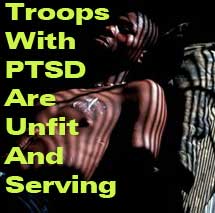 CBS News broadcast a report Thursday questioning whether American troops experiencing stress disorders are fit for duty.
CBS News broadcast a report Thursday questioning whether American troops experiencing stress disorders are fit for duty.
by Kaffie Sledge
Reporter Sharyn Alfonsi talked about soldiers diagnosed with post-traumatic stress disorder who had been returned to duty in Iraq.
Army Spc. Jason Gunn is one such soldier. According to the report, Gunn was critically injured while driving a Humvee that hit an improvised explosive device. His friend was killed. Gunn, who blamed himself, became depressed and paranoid. Doctors diagnosed him with PTSD. Four months after the explosion, however, Gunn was sent back to Iraq.
Gunn’s mother, Pat, said the Army sent them an e-mail telling them that although their son had PTSD, it was in his best interest to face his fears and go back to the front lines.
“Facing your fears” is contrary to all current medical and scientific knowledge, combat expert Dr. John Wilson told the reporter.
Is this yet another means of not dealing with the mental issues that shadow soldiers in the Iraq war?
It’s been estimated that 30-40 percent of soldiers returning from the Middle East have signs of war trauma — depression, anxiety, nightmares…
Hazeldon, a non-profit agency that offers a wide range of services and information on addiction, in 2003 reported that PTSD and addiction will remind us of the Iraq war. And so far, we have no information that the military is dealing with these unresolved mental health issues that plague returning soldiers.
In fact, PTSD and addiction often occur together, according to the National Center for Post-Traumatic Stress Disorder. The center predicts that 31 percent of male Vietnam veterans and 27 percent of female Vietnam veterans will experience PTSD at some point. PTSD has been detected in 8 percent of Gulf War veterans. Numbers could be higher for veterans of the Iraq war “because combat was longer and in some cases more intense. And U.S. troops face ongoing fear and trauma in Iraq,” the NCPTSD reports.
Being diagnosed with PTSD, according to the NCPTSD, increases the risk of an alcohol use disorder. PTSD also occurs among survivors of natural disasters, terrorists incidents, serious accidents, or personal assaults such as rape.
Sixty to 80 percent of Vietnam veterans seeking PTSD treatment have alcohol use disorders. People with PTSD are often binge drinkers. They often binge drink to suppress PTSD symptoms after something — a loud noise, a plane overhead, or an overwhelming thought or memory — reminds them of their trauma, the NCPTSD reports.
Alcohol can provide a temporary feeling ofdistraction and relief. At the same time, however, it reduces the ability to concentrate and be productive.
This is not to say every soldier will attempt to drown his or her PTSD symptoms, but if we are essentially patching them up and throwing them back into the war, we have no way of knowing the lethality of our decision.
ATTENTION READERS
We See The World From All Sides and Want YOU To Be Fully Informed
In fact, intentional disinformation is a disgraceful scourge in media today. So to assuage any possible errant incorrect information posted herein, we strongly encourage you to seek corroboration from other non-VT sources before forming an educated opinion.
About VT - Policies & Disclosures - Comment Policy



